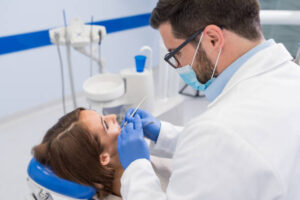Gum disease is often ignored as a simple dental issue as it is commonly linked to bad breath, bleeding gums, or mild discomfort. However, it’s essential to understand that sometimes gum disease can have far-reaching effects on your overall health and even your life. While it may seem surprising, scientific research shows that the dangers of gum disease spread well beyond the mouth.
In this blog post, we’ll explore how gum disease can cause severe health conditions and why it could be life-threatening. By providing some scientific studies, this blog post aims to raise awareness about the hidden risks of gum disease. Read on to understand why gum disease should never be taken lightly and learn how to protect yourself from its deadly effects.
What is Gum Disease?
Gum disease is also known as periodontal disease. It is an infection that affects the tissues holding your teeth in place. The condition is caused by plaque, a sticky film of bacteria that builds up on your teeth. If plaque isn’t removed by regular brushing and flossing, it can harden into tartar and then irritate the gums.
Gum disease advances through two main stages:
- Gingivitis.
- Periodontitis.
Gingivitis is the early stage, which can be seen as red and swollen gums that bleed easily. If left untreated, it can move to periodontitis, a more severe form of gum disease. In this gum condition, the gums and bones start to pull away from the teeth by creating pockets that can get infected.
Over time, the infection can damage the bone and tissue, which can cause tooth loss.
How Common Is Gum Disease?
Gum disease is more widespread than you may think. As per the Centers for Disease Control and Prevention (CDC), nearly half of adults aged 30 and older have some form of periodontal disease. The risk increases with age, with about 70% of adults aged 65 and above affected. Unfortunately, many people don’t recognize the early symptoms, such as bleeding gums, and often ignore them as minor. This is why gum disease usually goes unnoticed until it reaches a more serious stage.
Now that we know how common gum disease is let’s find the answer to a more critical question: Can gum disease be life-threatening?
Can Gum Disease Kill You?
Yes, gum disease can lead to life-threatening health problems. While gum disease itself may not directly cause death, its impact on the body can cause severe conditions that may be fatal.
The Fatal Risks of Gum Disease
Studies have shown that gum disease is strongly linked to an increased risk of cardiovascular diseases, such as:
- Heart attacks.
- Heart strokes.
The bacteria in the mouth don’t stay limited to your gums; they can enter the bloodstream through inflamed and bleeding gums. Once in the blood, they can travel to other body parts, causing inflammation and artery blockage, known as atherosclerosis. This condition seriously increases the risk of heart disease and stroke.
Research published in the Journal of Periodontology shows that people with advanced gum disease are at a much higher risk of developing heart-related issues. Moreover, the inflammation from gum disease can trigger the formation of blood clots, which can block blood flow and potentially cause a heart attack.
The Hidden Dangers of Periodontal Disease
Gum disease doesn’t only affect your gums; it can have a far-reaching impact on your overall health. One of the most concerning results is its role in worsening other chronic conditions. Harvard Health research shows that people with periodontal disease are nearly twice as likely to develop heart disease. This is because bacteria from the mouth can cause inflammation in blood vessels which causes blood clots that may block blood flow and trigger a heart attack.
Let’s explore these connections in more detail.
Gum Disease and Diabetes
Gum disease can complicate diabetes by making it harder for patients to control their blood sugar levels. The chronic inflammation caused by gum disease can worsen insulin resistance, which leads to higher blood sugar levels. In turn, this increases the risk of diabetic complications like:
- Kidney disease.
- Nerve damage.
- Poor wound healing.
Gum Disease and Respiratory Diseases
In some cases, the bacteria from gum disease can be inhaled into the lungs which causes respiratory infections. For patients with pre-existing respiratory conditions like chronic obstructive pulmonary disease (COPD), gum disease can worsen these conditions. It makes breathing more difficult and increases the risk of serious infections, including pneumonia.
Gum Disease and Pregnancy Complications
Pregnant women with gum disease are at a higher risk of complications, such as preterm birth and low birth weight babies. The bacteria and inflammation from gum disease can enter the bloodstream and affect the developing fetus. This can cause an increased risk of premature labor and other complications during pregnancy.
The Potential Link to Cancer
Some studies show a link between gum disease and certain types of cancer, including pancreatic and oral cancer. While more research is needed to fully understand this connection, chronic inflammation linked to gum disease is believed to play a role in the development of these cancers.
Gum Disease and Kidney Disease
Gum disease is also associated with chronic kidney disease. Studies, including one published in BMJ Open, show that severe periodontal disease can increase the risk of kidney failure. The bacteria from gum disease can enter the bloodstream and then travel to the kidneys. If left untreated, this can damage the kidneys and lead to life-threatening complications.
The Mechanism: How Gum Disease Leads to Fatal Conditions
When gum disease advances, the bacteria can enter the bloodstream through inflamed gums. Once in the blood, these bacteria travel throughout the body and then cause inflammation in various organs. The chronic inflammation triggered by gum disease is dangerous because it can worsen other conditions, such as:
- High blood pressure.
- Kidney problem.
- Heart disease.
For example, arterial inflammation can increase the risk of developing atherosclerosis. On the other hand, inflammation in the kidneys can impair their function. Both of these conditions can cause some severe, life-threatening complications if not managed properly.
Preventing Gum Disease
The good thing is that gum disease is preventable. Following a few simple habits can reduce your risk of developing gum disease and its associated health complications.
Good Oral Hygiene Practices
Always brush your teeth twice daily with fluoride toothpaste to remove plaque and prevent tartar buildup. Flossing daily is also essential for cleaning between your teeth and along the gumline. Using an antibacterial mouthwash can also help reduce bacteria in your mouth and prevent plaque formation.
Diet and Lifestyle Changes
Eating a balanced diet of fruits, vegetables, and whole grains can help keep your gums healthy. Limit sugary snacks and beverages, as they can boost plaque buildup. Furthermore, avoiding tobacco products is crucial, as smoking is a big risk factor for gum disease.
Regular Dental Check-Ups
Visit your dentist regularly for professional cleanings and early detection of gum disease. Regular check-ups allow your dentist to detect any issues early and recommend treatment before the disease progresses to a more severe stage.
Treatment Options for Gum Disease
If you already have gum disease, seeking treatment is not too late. The treatment you need will depend on the condition.
- Gingivitis: In the early stages, gum disease can usually be reversed with professional cleanings and improved oral hygiene.
- Periodontitis: Deep cleaning treatments are necessary for more advanced gum disease, such as scaling and root planing. These treatments remove tartar from below the gumline and smooth the roots of the teeth to help the gums reattach.
- Surgical Treatments: In severe cases, surgical procedures like flap surgery or bone grafts may be required to restore damaged tissue and bone.
Conclusion
Gum disease isn’t just a dental issue; it’s a serious health threat. The bacteria and inflammation linked with gum disease can lead to life-threatening conditions. If you take preventive measures and seek treatment early, you can reduce the risks and protect your health.
At Moston Dental Practice, we focus on improving your oral health by using advanced technology to diagnose and treat gum disease. Don’t ignore potential risks; schedule your appointment to keep your gums healthy.
Prioritise regular check-ups for healthier oral health. Call us to book your consultation now.




